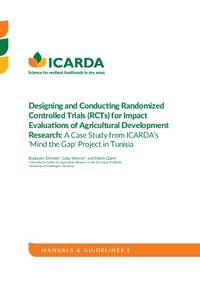Designing and Conducting Randomized Controlled Trials (RCTs) for Impact Evaluations of Agricultural Development Research: A Case Study from ICARDA’s ‘Mind the Gap’ Project in Tunisia
Published Date
March 07, 2018
Type
Manual

Authors:
Jutta Werner, Matin Qaim
This document is designed to help researchers apply RCTs so they can gain a more accurate insight into the impacts of different extension strategies in different locations. It provides information on the benefits of an RCT approach in comparison to other impact evaluation models; provides a step-by-step implementation guide and a framework to avoid challenges; and demonstrates how an RCT approach was implemented within the context of the ‘Mind the Gap’ initiative.
Citation:
Boubaker Dhehibi, Jutta Werner, Matin Qaim. (7/3/2018). Designing and Conducting Randomized Controlled Trials (RCTs) for Impact Evaluations of Agricultural Development Research: A Case Study from ICARDA’s ‘Mind the Gap’ Project in Tunisia. Beirut, Lebanon: International Center for Agricultural Research in the Dry Areas (ICARDA).
Keywords:
dry areas
impact evaluation
development evaluation
program evaluation
randomized control trials (rcts)
tunisia
agricultural extension
